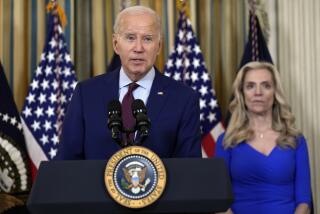Clinton Implores Firms to Invest in Poor Areas
- Share via
ATLANTA — From the White House Rose Garden to the cradle of the civil rights movement, President Clinton conducted a traveling seminar Tuesday on the need to invest in stubborn areas of urban and rural poverty, declaring: “We can bring the benefits of free enterprise to every neighborhood in America.”
In an era when the nation’s peacetime unemployment rate is at its lowest point in four decades, the rate in 37 cities is twice the national average, the president said.
Touting his plan to spur investment in “underserved” areas, Clinton challenged executives of some of the nation’s largest companies to spend money in some of its poorest communities. “We don’t have to leave anyone behind,” the president said. “And if we can’t do this now, when in the wide world will we ever get around to it?”
The New Markets Initiative was rolled out at the beginning of the year but has been given little attention in a White House focused first on preserving the Clinton presidency and then on the war in the Balkans.
The president unveiled plans Tuesday for a grand tour in early July of some of the nation’s most notorious pockets of poverty--perhaps the Mississippi Delta, Appalachia, a Native American reservation and several cities, said Housing and Urban Development Secretary Andrew Cuomo.
The initiative is built around a proposed tax credit worth 25% of investments in community development banks, venture funds and corporations, and other vehicles intended to create $6 billion in equity capital for inner cities and poverty-stricken rural areas.
It would operate similarly to federally sponsored programs that guarantee private investments by Americans in emerging markets overseas. The plan also would provide guarantees by HUD and the Small Business Administration, through a $300-million fund, for development projects or larger businesses relocating in poorer neighborhoods.
Funds have not been earmarked, however, for specific communities. The plan still needs congressional approval.
On a day that began with a White House meeting with the chief executives of 15 major corporations, Clinton devoted an unusual amount of time drawing attention to his effort to tackle one of the most difficult economic issues still facing him after six years in office.
“Our greatest untapped markets are here at home--at the least, $85 billion in untapped markets,” he told the executives.
Later, he flew to Atlanta with many of his White House guests, toured the Sweet Auburn Curb Market and conducted a second round of his investment seminar.
Atlanta’s Sweet Auburn neighborhood is home to the Ebenezer Baptist Church, where the Rev. Martin Luther King Jr. and his father preached. The King Center, where the civil rights leader’s crypt is located, is nearby, as are the headquarters of the Southern Christian Leadership Conference.
About 24 small businesses are located in the market, among them produce vendors, a florist, a garden center, a seafood market and restaurants. The enterprises receive more than $8.3 million in federal assistance, including grants for equipment and property rehabilitation, according to the White House.
Admittedly tossing aside all dietary restraint, Clinton fueled himself with a free sample of sweet potato cheesecake. And he couldn’t refrain from conducting an inventory of other goods in a bakery case--calling out “apple pie, cherry pie,” and then explaining to Sonya Jones, the proprietor of the Sweet Auburn Bread Company: “I’m just curious what you make.”
The goal of black Atlanta has been to revitalize the Sweet Auburn community, and the King Center is one of the largest tourist attractions in the South. But it has failed to generate widespread economic revenue, and has shrunk as an economic hub since the days when Atlanta was segregated and the community was the center of African American life.
Some merchants said they are struggling--some for want of customers, others from the difficulty of attracting employees.
Before an audience that included the chief executives of enterprises such as American Airlines and the Goldman, Sachs investment house, the president drew Jones into a discussion of how health- and child-care benefits could help attract workers--a problem at the market even in a community of perpetually elevated unemployment.
“We should be able to pool together within the area,” Jones said, and, joining in a benefits program with larger companies, offer the same health care programs as major firms.
*
Times staff writer Sam Fulwood III in Washington contributed to this story.
More to Read
Inside the business of entertainment
The Wide Shot brings you news, analysis and insights on everything from streaming wars to production — and what it all means for the future.
You may occasionally receive promotional content from the Los Angeles Times.










